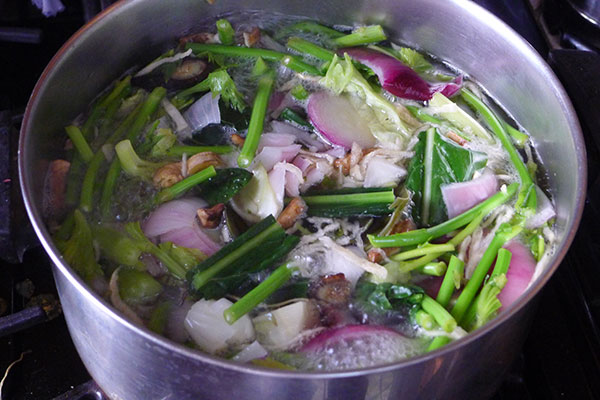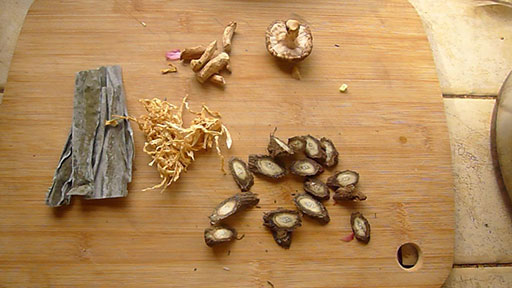A Winter Cleanse Soup is a good remedy for the overeating of heavy rich foods that occurs around the Thanksgiving and Christmas holidays. So, at the end of January, or in Early Spring, restor your gut microbiome by making a Chinese Medicine Soup with vegetables that specifically nourish and cleanse the body. This is what Ayurvedic medicine refers to as mono-diet fasting, in which you rest your digestive tract by eating one single simple, easy to diget, food for a day or longer.
And if you have been overeating, and and are suffering from symptoms of food stagnation, try a couple of doses of the Chinese Herbal medicine Bo He Wan, Preserve Harmony Pill.
The Idealized Chinese Medicine Diet
This soup is typical of the Qing-Dan (Clear and Light) diet recommended by the great Chinese Medicine Doctor of the middle ages, Li-Dong Yuan, who was obsessed with the role of good digestion and assimilation as a cornerstone of health. Li Dong, like the Ayurvedic physicians, wanted a diet that was light, not too rich, and easy to digest.
Concentrated vegetable broth with strong vegetables like shitake mushroom, burdock root, and dandelion greens is a method especially suitable for winter. This is because it preserves the integrity of what Ayurveda calls the Agni digestive fire. And because its in soup form, its nourishing, easy to digest, and cleansing all at the same time. Ideal for this season.
Winter Cleanse Soup with Burdock, Dandelion, and Kombu
Ingredients
- 4 quarts water, more or less.
- 3-5 carrots, to taste, and depending on size, sliced lengthwise and chopped a bit
- 1 beet, sliced
- 3-5 celery stalks, chopped
- 1 cup dandelion greens. If not available substitute with bok choy or cabbage
- 1 bunch parsley
- 1 cup burdock root, sliced lengthwise and chopped a bit.
- 1 4 inch piece of kombu sea vegetable, or dulse
- 2-3 large slices of raw ginger root, or about 1/3 of a cup diced
- 1/2 tsp fenugreek seed, 1 tsp black pepper corn, 1 tsp coriander seed
Directions
Place all the ingredients for your Winter Cleanse Soup except the parsley and greens in a large pot with the water and bring to a low boil. Low boil until the vegetables are almost fully cooked, and add the greens. Simmer until the greens are well darkened. Allow to cool and strain into a glass jar or stainless steel pot.
The idea of overcooking the dandelion greens here is to liberate the minerals and other nutrients from the cellulose of the vegetables and into the broth, so don’t worry about over-cooking. Keep the heat relatively low. This is more like cooking Chinese herbs; when the soup is cooked all the goodness is in the broth, and the veggies you can eat or compost.
This is a variation on the theme of a Summer cleanse detox drink/ soup I also make.
How to Use as a Cleanse
- Drink a tall glass of this first thing in the morning, and at least three times a day for two days.
- The rest of the day eat just small amounts of very simple, low-fat, low protein food, like whole grain sourdough rye , cooked starchy and green vegetables, like winter squash and broccoli.
- If you need protein, try some tempeh roasted over a low flame in a cast iron pot with ginger or tofu and bean sprouts stir fried with a green veggie.
Modifications
- Delete the beet if you don’t want the red color.
- If you want it more savory or sweeter, add a sliced yellow or red onion.
- If you must, add some sea salt to taste.
As A Base for Miso Soup
- You could also use this recipe as a base for miso soup. Just add some mellow or sweet white miso at the end and simmer for three minutes.
I might add chopped scallions at the end in that case
As A Base for Fish Soup
You can use this Winter Cleanse Soup as the stock for a fish soup. Fish is naturally warming, or hot energy, so this has a good balancing effect with the cleansing nature of the veggies.
Cook the veggies less long than as for the Winter Cleanse Soup, and when near done, add fresh salmon or some kind of white fish like cod. Scallops or Shrimp work very well, too. Serve with Japanese buckwheat soba noodles.
Dandelion Greens– Nutrients and Medicinal Effects
Dandelion greens are a diuretic, and foods eaten over the holidays tend to cause water retention. So this is an excellent remedy. They also have a cleansing effect on the gall bladder.
Dandelions are very rich in nutrients. Traditionally, the roots and leaves of the plant have been used as medicines for breast maladies, bloating, digestive disorders, aching joints, fevers, and skin disorders. The leaves of the plant are very rich in vitamins, including A, C, D, and B-complex.
Dandelion Greens also have high levels of minerals like iron, magnesium, zinc potassium, manganese, copper, choline, calcium, boron, and silicon. The most active ingredient in dandelions, eudesmanolide and germacranolide, are found only in dandelions.
Burdock Root and Kombu
Burdock Root is a traditional cleansing vegetable that is used in East Asia to remove toxins from the blood and improved the function of organs like the liver, kidneys, and intestines, which play a role in detoxification. It has gentle laxative, diuretic, anti-bacterial and anti-fungal properties.
Kombu seaweed is used in Chinese Medicine medicinally to de-congest the lymphatic system and reduce swellings. It is excellent year round, but especially in cold season. Wakame, too. I will write soon all about using sea vegetables in cooking
Spices
Fenugreek is a lovely, warming, slightly bitter spice that is not at all hot, and has a very nice almost maplely fragrance. Excellent for nursing mothers, and for warming the uterus in menstrual cramps
Coriander is an excellent sweet digestive spice that is mildly cooling, so that it balances the pungent flavors of spices like black pepper and veggies like radish. It is used in Ayurveda to lover fevers and is strongly antibacterial, so coriander is excellent to prevent the secondary bacterial infections that can arise with colds and the flu. Coriander also used to treat and prevent colds. For more on using Ayurvedic spices to prevent and treat colds and flu, see Ayurvedic Tea for Colds and Flu
Black Pepper is a pungent interior warming herb that is excellent for digestion and is used in Ayurveda to reduce phlegm. If you can find Long Pepper, that is also excellent for digestion and the lungs. All three of these spices pacify Kapha, and Coriander also pacifies Pitta and Vata.
Eyton J. Shalom, M.S., L.Ac.
Ayurvedic and Chinese Medicine since 1992
619/296.7591
www.bodymindwellnesscenter.com
copyright eyton shalom, san diego, ca, january 2009, all rights reserved, use with permission



